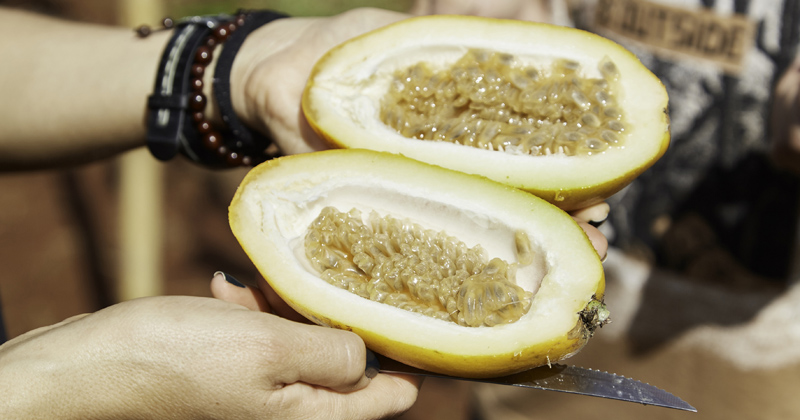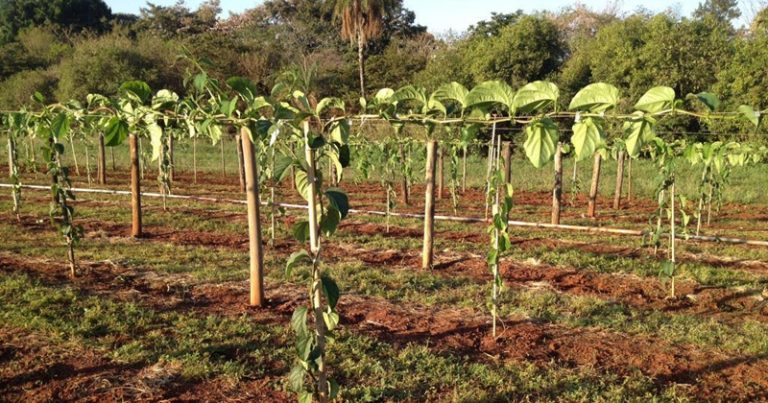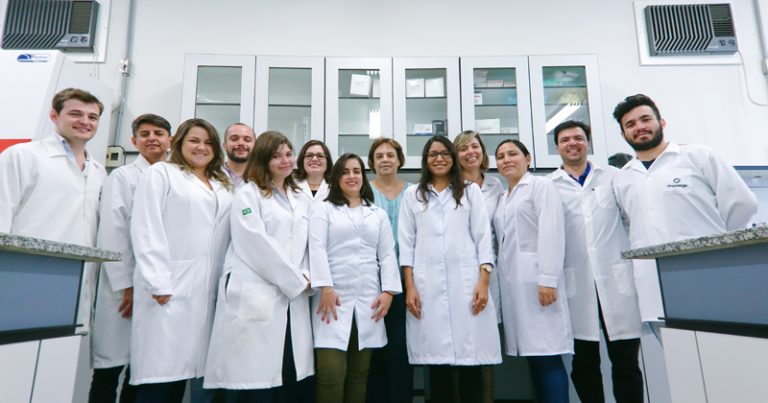
The yellow passion fruit is the most consumed by Brazilians, presenting a sour and acid flavor. However, depending on the genetic improvement research at USP, the sweet passion fruit (Passiflora alata) will soon be occupying more spaces in the stands of the fairs, grocery stores, and supermarkets. Studies conducted since 2005 have now reached promising results. The new genetically improved fruits have a higher amount of pulp, thinner skin, and increased crop productivity. Professor Maria Lucia Carneiro Vieira, from the Genetics Department at USP’s Luiz de Queiroz School of Agriculture (Esalq), in Piracicaba, led the research team.
The results of the research represent higher profits for Brazilian fruit growers since the prices of these fruits, which are in the exotic category, reach three times more than the prices of sour passion fruit. An article on the latest results was published on PLoS ONE Improving research resources and fruit quality in sweet passion fruit: genotype detection by interaction in the environment and selection of promising genotypes in May. The Dissertation Genetic Studies in a segregating sweet passion fruit population selected for fruit quality (Estudos genéticos em uma população segregante de maracujá-doce selecionada para qualidade de frutos), written by Lourdes Chavarría Perez, advisee of Maria Lucia, details the subject.
In Brazil, the cultivation of passion fruit is comprised almost entirely by the sour cultivar, which covers approximately 90% of all orchards. The cultivation of sweet passion fruit is limited by the instability of fruit quality from one crop to the next; as well as by the lack of genetic studies that would result in improved varieties and meet consumer needs in terms of quality and yield. Based on these issues, researchers in the field of genetics and plant breeding at Esalq committed themselves to find the solution.
Population derived from the cross between the Amazonas x São Paulo sweet passion fruit

The six best genotypes (characteristics related to fruit weight, skin thickness, and pulp content) present in Esalq’s experimentation area are the results of decades of research. The work began in 2005 from the cross between a genotype of Amazonas origin and another from the Southeast of the country (São Paulo). “The best genotypes of sweet passion fruit were reached after evaluating the progenies (offspring) of this crossing during many harvests obtained from plantations in different regions”, explains the researcher.
According to Maria Lúcia, research on genetic improvement in plants are, in general, long and time-consuming because each phase of the study requires that plants be grown in at least three different regions, with each harvest lasting, on average, eight months. “Each planting area requires at least 600 plants because it is necessary to repeat the tests to be sure of the best genotypes in different environments and crops”, explains the researcher to Jornal da USP.
First, “we evaluated a hundred ‘progeny’, from which the best thirty were selected, which were, in turn, reevaluated, finally, arriving at the six superior genotypes that contain the characteristics that the researchers sought at the beginning of the study”. The fruits have higher quality, with attributes that please the consumer and the farmer: reduced skin, increased pulp, and higher crop productivity. “In percentage, this means an increase in pulp weight from 22.4% to 30%; 26% decrease in skin thickness; and 41% gain in production area (fruits per area)”, reports Maria Lucia.

According to the researcher, the result of this study on genetic improvement will bring more security to the farmer who produces sweet passion fruit, which has a high potential to be commercially exploited as tropical fruit for internal and external consumption. Maria Lucia also stated that the seedlings should be available for agricultural use in 2021. There is a company already interested in this project, which was financed by the Research Support Foundation of the State of São Paulo (Fapesp).
Watch the video on genetic improvement made by researchers of the Post-Graduation Program on Plant Genetics and Breeding of Esalq.
More information: e-mail mlcvieir@usp.br with Maria Lúcia Carneiro Vieira
